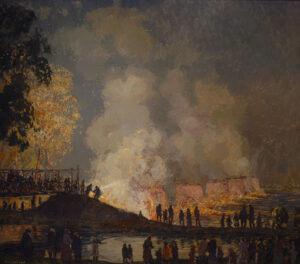The Burning of Center Bridge by Edward Redfield

Image credit: Edward W. Redfield, (1869-1965), The Burning of Center Bridge, 1923, oil on canvas, H. 50.25 x W. 56.25 inches, James A. Michener Art Museum. Acquired with funds secured by State Senator Joe Conti, and gifts from Joseph and Anne Gardocki, and the Laurent Redfield Family.
About the Artwork
Looking Questions
- What do you see in this painting? Describe the details.
- Where does your eye travel to first? Why?
- What time of day is it? What season is it? Explain.
- If you were standing in this landscape, how are you positioned?
- If you were in this painting, what kinds of sounds would you hear?
- If you could tell a story about this work, what would it be?
About the Artist
Among the New Hope impressionists painters, Edward Willis Redfield was the most decorated, winning more awards than any American artist except John Singer Sargent. Primarily a landscape painter, Redfield was acclaimed as the most “American” artist of the New Hope school because of his vigor and individualism. Redfield favored the technique of painting en plein air, that is, outdoors amidst nature. Tying his canvas to a tree, Redfield worked in even most the brutal weather. Painting rapidly, in thick, broad brush strokes, and without attempting preliminary sketches, Redfield typically completed his paintings in one sitting. Although Redfield is best known for his snow scenes, he painted several spring and summer landscapes, often set in Maine, where he spent his summers. He also painted cityscapes, including, most notably, Between Daylight and Darkness (1909), a atmospheric tonalist painting of the New York skyline in twilight.When Redfield stopped painting in the mid – 1940s he began producing hooked rugs and painted furniture. He died at the age of ninety-six in 1965.
Redfield was awarded a retrospective exhibition at the New Hope branch of the James A. Michener Art Museum, Edward Redfield: Just Value and Fine Seeing, in 2004, accompanied by a catalogue with the same title.
Activities
- Museum Activity Sheet: Newsflash: What’s the Story?
- Create your own impasto painting.
- Visit Center Bridge and discuss how it looks today versus in the painting.
- Learn about warm colors and create a painting mixing orange, red, and yellow.
- Create a poem about the place in this painting.
- If you were a newscaster reporting on this fire, what would you say?
- If you had to call the fire department, but didn’t know the address of the fire, how could explain to them the location based on the details you see in the painting?
Related Resources
- Focus on Burning of Center Bridge Gallery Activity
- Looking at The Burning of Center Bridge Resource Guide
- Redfield Impasto Activity Lesson
- Edward W. Redfield, Bucks County Artist Database
- The Painterly Voice: Bucks County’s Fertile Ground
- Google Arts and Culture: The Burning of Center Bridge
- Youth Audio Tour Stop: The Burning of Center Bridge
- Audio: Permanent Collection Mobile App
- Edward Redfield Gallery Guide
- Canal and Artists on YouTube